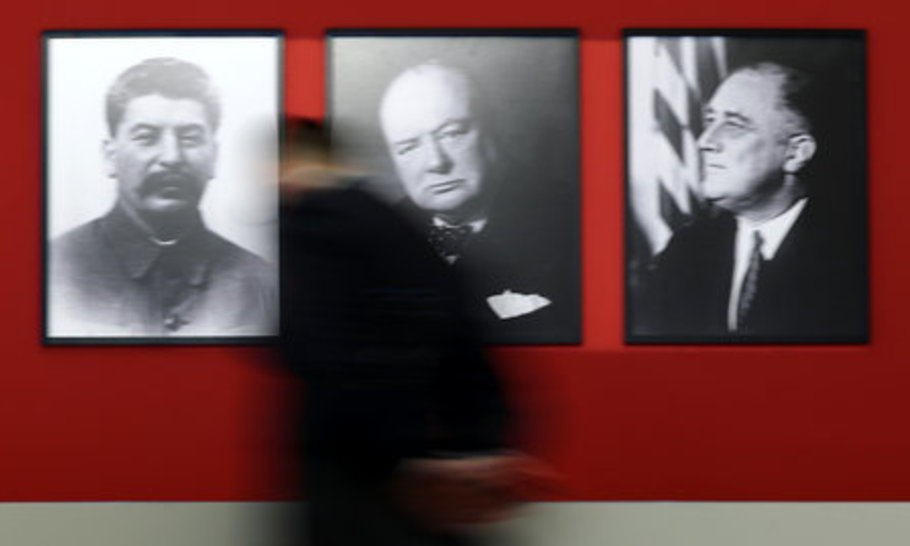Boris says we are past the peak. Is this the beginning of the end?

Mikhail Tereshchenko/TASS
The nation’s mood has visibly lifted since Boris Johnson returned to the fray this week. His conduct of the daily press conference yesterday was not perfect, but he was able to deliver two clear messages: we are past the peak and he has a plan to ease the lockdown. Buoyed by the birth of his baby, his enthusiasm is infectious. People felt they had something extra to clap for last night. The curve is now well past its inflexion point; deaths are falling; the tide, at last, is turning.
But it is not over yet. We are at the point in our war on coronavirus that we reached in the Second World War in November 1942, when Churchill celebrated victory in what he called the battle of Egypt (now usually called Alamein) by ordering the church bells to be rung for the first time since 1939. In his Mansion House speech, he came up with one of his most memorable utterances: “Now this is not the end. It is not even the beginning of the end, but it is, perhaps, the end of the beginning.”
Churchill was right: the war lasted nearly three more years, bloodier even than the first three. Montgomery’s defeat of Rommel was costly; far more so Zhukov’s victory at Stalingrad soon afterward. Far worse was to come. Even though the Germans never won another battle, their fanatical determination to fight to the end meant that by the time of their unconditional surrender, the 75th anniversary of which falls this month, Europe lay in ruins. When we commemorate VE Day next Friday, we shall remember all those who lost their lives. Estimates of total casualties vary between 70 and 85 million, including 20-30 million from disease and famine. Most, however, died in the years 1943-45, when victory was in sight, but tantalisingly out of reach.
With better Allied leadership, could World War 2 have been ended much sooner? Forty years ago, the author John Grigg argued that it could, in his book 1943: The Victory That Never Was. Grigg was a contrarian and a controversialist, who had been Lord Altrincham until 1963, when he was the second peer, after Anthony Wedgwood-Benn, to disclaim his title. But he made a strong case that Churchill, after his magnificent achievements in 1940, lost his nerve after subsequent British reverses, especially the loss of Singapore in 1942. As a result, he did not dare to risk an Allied invasion of France in 1943, despite the success of the landings in Tunisia earlier that year. Grigg’s argument is that if D-Day had taken place a year earlier, the Germans would have surrendered much sooner and Central Europe spared the consequences of Soviet occupation.
Grigg’s argument is unprovable, as all counterfactuals (or might-have-beens) always are. At the time he advanced his thesis in 1980, the military historian Sir John Keegan, later defence editor of the Daily Telegraph, strongly disputed it. Grigg, he argued, had underestimated the power of the German panzer divisions, still formidable in May or June 1943, before meeting their nemesis in the Battle of Kursk in July. Keegan pointed out that the Americans were mauled in their first encounter with seasoned German troops at the Kasserine Pass in Tunisia. The Western Allies were just not ready to take on the full might of the Wehrmacht in 1943, he concluded.
In the preface to a new edition of his book in 1999, Grigg responded robustly to Keegan. The Germans did not transfer significant armoured forces to Normandy in June 1944; how much less able to do so they would have been a year earlier, when the Russian front lay hundreds of miles further to the east. As for the inexperience of the US troops: they fought well in the Pacific in 1943. True, even in December 1944 the Germans achieved a temporary success in the Ardennes, the so-called “Battle of the Bulge”; but the Americans quickly recovered and won a victory that shortened the war.
Virtual history is an enjoyable parlour game. Gambling with real lives, as statesmen and generals must, is something else. It is as easy to overlook the errors of past leaders as it is to debunk them. Hindsight is already being deployed to castigate Boris Johnson and his ministers for their handling of the pandemic. In retrospect, we may decide that their mistakes were indeed culpable and cost lives unnecessarily. But it is as well to remember that even Churchill was not above criticism during the war, let alone since. After the fall of Tobruk in June 1942, only 40 per cent of the public had confidence in the Government’s handling of the war, though Churchill’s personal popularity was still around 80 per cent. Confidence recovered after Monty’s victory, but morale dipped again after the German V1 flying bombs (“doodlebugs”) began to fall on London in June 1944, later followed by the even deadlier V2 rockets. Churchill was fêted on VE Day, but his popularity could not save him; within two months he had been evicted from office by a huge majority.
Emerging from lockdown will be perilous. It will require discipline and self-sacrifice for months, perhaps years, to come. There will be mistakes. But the next few days may be decisive. By this time next week, we will know how the Government proposes to handle the second phase. Today, the Government remains popular, even as the chorus of criticism of grows louder. The Prime Minister should use his even greater personal popularity to persuade the public to trust his leadership. He, after all, is the man with the plan. For now, at least, we have no choice but to back Boris.





